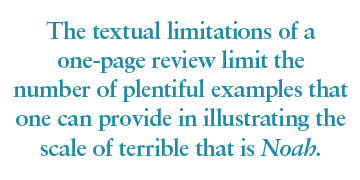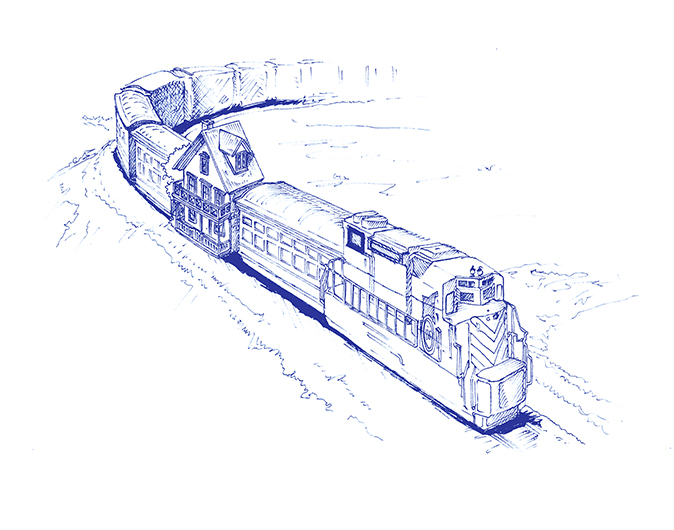In case you were wondering, Darren Aronofsky’s Noah sucks

It was hard to believe that I was actually seeing Noah. But I was. And it was awful. But it was also fascinating.
I went to high school during a time in which Darren Aronofsky’s films — with their quick editing, “dark” themes, and moody Clint Mansell soundtracks — were heralded as the new ideal in filmmaking among insecure teens such as myself. To pretend to “get” Pi was to assert one’s knowledge of contemporary “indie” cinema, and the fact that Requiem For a Dream was released unrated was then still a big deal because studios had not yet co-opted the practice to double their DVD revenue on the latest direct-to-video American Pie sequel.
Noah was allegedly conceived by Aronofsky as early as 2000, and its development has played out over the years in the forms of brief mentions in interviews and rumors circulating around the Internet. This film’s potential existence was on my mind as I defended The Fountain, just as it subconsciously lingered when I saw The Wrestler and Black Swan. This is not to imply that I was ever awaiting the arrival of Noah with much particular excitement, but rather to simply illustrate that the idea of Aronofsky seriously making a movie of Noah’s Ark struck me as outlandish from the start. My fascination continued to grow as Aronofsky’s career became increasingly celebrated.
When Noah finally began to make waves over the past year with occasional leaked news tidbits about production developments and casting choices, my modest interest began to transform into a morbid curiosity. Aronofsky may have briefly rehabilitated the washed-up career of Mickey Rourke with The Wrestler, but the choice to place Russell Crowe (an actor whose glory days seem irretrievably distant) in Noah’s eponymous role seemed like suicide for the film. As Noah entered post-production and stories began to circulate about disputes between Paramount and Aronofsky as well as reported dissatisfaction among test audiences, the likelihood that Noah was going to be terrible seemed to have been unavoidable.
It’s difficult to precisely describe the experience of viewing Noah. The first half leaves me feeling conflicted about its potential merits – the acting was stiff and the production design uninspired, but Aronofsky managed to squeeze in enough visually intriguing moments that I was finding myself pleasantly surprised. Eventually, however, the entire thing dissolves into a complete laughable mess.
The first sign that things are going south for Noah occurs when Aronofsky introduces us to The Watchers – a clan of fallen angels that have been transformed by “The Creator” (Noah’s cop-out stand-in term for “God”) into grumpy rock creatures that detest humanity. The Watchers speak in garbled, detuned “scary” voices and resemble rejected CGI mockups from an alternate version of Lord of the Rings.

As the film rolls forward, it rapidly devolves into a sloppy hodgepodge of tired tropes from contemporary fantasy epics and ham-fisted attempts to tie the biblical version of Noah’s Ark to modern-day environmental concerns. Noah’s primary antagonist in the film is Tubal-Cain (played by Ray Winstone, who is really giving it his all), a biblical descendent of Cain. Aronofsky has liberally interpreted the character as a grimacing, metal-clad Bad Guy King who arrogantly ignores Noah’s proto-hippie warnings that man’s destructive tendencies will quickly lead to complete annihilation. When the Great Flood finally, mercifully starts to wash away the film’s armies of “evil” humans dressed in inexplicable costumes of dirt-stained black denim, Tubal-Cain manages to drag Noah kicking and screaming into absolute hogwash territory by scaling the ark and chopping through its hull with his trademark tiny axe. As the film progresses painfully into its final (and most ludicrous) act, Tubal-Cain stows himself away in the depths the ark, where he survives by literally tearing apart and eating Noah’s animals to stay alive.
The film reaches its apex of laughable intensity near its conclusion, when Noah stands, conflicted, above the sleeping bodies of his two new infant grandchildren. Noah has steadfastly believed that a significant part of his mission from The Creator is to ensure the extinction of mankind by denying his sons the right to find some girlfriends that they can take along on the ark. It’s a long story, but Noah’s kind-of adopted daughter becomes pregnant and Noah must decide whether or not he wants to murder her babies to ensure that his mission is a success. The camera lingers for what seems like hours on a poorly-rendered shot of a knife blade dangling inches away from the babies’ faces. At this point I almost completely lost it. Is he going to do it?
Obviously, he’s not going to do it.
The textual limitations of a one-page review limit the number of plentiful examples that one can provide in illustrating the scale of terrible that is Noah. The subject of the film’s animals, which are rendered using computer graphics that would have been yawn-worthy in 2002 and presented in a series of excruciating sequences during which the ark is filled with creatures, could take up an entire article on their own. Emma Watson’s cringeworthy performance alongside her dull-as-dirt “love interest” Douglas Booth is especially gag-inducing. Noah descends into a depressive state after the flood, and becomes transformed into a vagrant alcoholic beach hobo.
There’s too much to report. See Noah if you must, but don’t say you weren’t warned.







